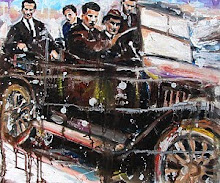In Ireland using your name in Gaelic produces discussion and even difficulties of pronunciation despite the fact that Gaelic is compulsory in Irish schools, both primary and secondary levels. One reason is that Gaelic spelling was modernised in the 1940s and 1950s. As an example, I like to say that Gaelic now has a more modern spelling than English, as the many extra consonants in Gaelic were reduced by using an accent. For example, ‘oidhche’ (night) was changed to ‘oíche’ (unlike in English where the extra consonants were not changed from ‘night’ to ‘nite’ as the Americans use).
In my surname ‘croidhe’ was changed to ‘croí’ but like in many Gaelic surnames the old spelling is retained. So Croidheáin is believed to be ‘croidhe’ (heart) and ‘áin’ (noble), (noble heart) and is a word still used in Donegal Gaelic-speaking areas for a gallant or a suitor. It is pronounced ‘kree-an’. In other words, like in ‘night’ most consonants are not pronounced or at least have a different sound to English. For example ‘mh’ is pronounced with a ‘v’ sound so you get ‘caoimh’ pronounced ‘keev’. Caoimhghin is ‘caoimh’ (fair/gentle) and g(h)in is ‘birth’ similar to the Greek ‘gen’ (birth) and pronounced in Gaelic as ‘keeveen’. I have seen on an old map from the 1800s a church rendered ‘Kilkeevin’ (Church of St Kevin, Co. Roscommon) showing that the phonetical link between caoimhghin and kevin was retained until it lost an ‘e’ and became kevin.
My father was Kevin Cryan (like me) but Gaelic speakers in Ireland use their names in Gaelic unlike most of the population who have Gaelic names (and learned Gaelic in school) but speak in English (like my father). The phonetical spelling of Irish names and places was carried out by an English colonial administration who spoke no Gaelic and wrote down what they heard. As a result, for example, with my surname I have found three phonetical variations (Crean, Cryan and Crehan depending on local accents) and over 40 different spellings.
Ireland is a mainly Anglophone population today and with Brexit will become (ironically) the only English native-speaking population in the EU. There are Anglo-Saxon elements alright in Ireland but like Scotland, Wales and Cornwall (all Celtic areas) were invaded by the Normans and Anglo-Saxons.
Gaelic is one of two official languages and legally Gaelic takes precedence over English which means I can use the original Gaelic version of my name (even on my passport) without having to legally change it. For those who come to Ireland to learn English, be warned – Irish people speak Hiberno-English which means that our English retains some words, syntax and expressions from the Gaelic language. For those interested in this see How the Irish Invented Slang: The Secret Language of the Crossroads by Daniel Cassidy which may be a bit over the top but not fully contradicted either. There are even dictionaries of Hiberno-English.
The struggle to make Gaelic the common language in Ireland is still ongoing, and, indeed I have Irish Gaelic-speaking friends who refuse to speak to me in English. As a minority language Gaelic is not in a bad shape with Gaelic-medium schools, television, radio, press, websites and even Google translate.
The word Irish is generally used in Ireland for the Gaelic language to distinguish it from Scottish Gaelic, its linguistic sister (“Scotland” comes from Scotti, the Latin name for the Gaels).














